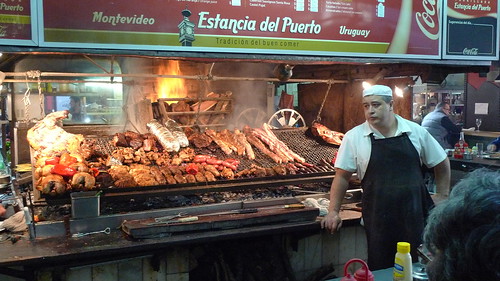Unless you happen to be a raw food enthusiast, if someone was to ask you what your favourite foods were you’d probably come up with dishes like sausage and mash, black cod, roast beef, a good steak, chips or a proper hamburger. Not many people would choose a salad or a raw piece of meat. However, this situation might be entirely different had one of our distant ancestors not had the genius idea of cooking food for the first time – but when did that happen and why did they do it?
Cooking food goes back around 400,000 years to the very first evidence of controlled use of fire by humans. It’s one of the traits that sets humans apart from animals and has been central to many civilisations, from the Romans and Greeks through to the Saxons and Normans. With the controlled use of fire, important changes began to be made to the way that human beings lived their lives. With the light that fire provided people could stay up after the sun had gone down and the day became longer.
It also allowed people to cook their food, which some scientists believe is responsible for considerable brain expansion in human beings, possibly even the kind of brain development that took us from being just like our ape-like ancestors, to the iPod toting, suit wearing deep thinkers that we all are today.
The argument – put forward by Richard Wrangham of Harvard University – is that by cooking our food we could now absorb more calories because warming things up allowed us to eat the kinds of complex carbohydrates that we couldn’t otherwise have digested. Think about a bowl of brown rice – would you eat it raw? No. But once cooked, it’s a great source of slow release energy that can provide motivation for everything from sport through to taking an exam. Not everyone agrees with Wrangham, as many scientists believe that human brains began to evolve when we moved away from eating just nuts and berries to eating meat, but it’s an interesting theory nonetheless.
It is likely that the earliest attempts to cook food stemmed from the need to eat more in a world where much of what was available was indigestible to human beings. However, once cooking had begun, the idea of it quickly spread, and by 250,000 bp there is evidence of lots of cooking devices – hearths and earth ovens for example – all over Europe and the Middle East. It is probable that the human digestive system has evolved around a cooked food diet – which has allowed us to eat all kinds of foods that would have given us substantial trouble without being cooked first! There is also evidence that the human body as a whole has evolved through this process – for example human jaws became smaller as there was less of a need for enormous teeth to cope with eating raw meat.
Over the years, many other positives for cooking food have been discovered – for example food lasts longer if you cook it first and it’s possible to avoid food poisoning by cooking food that would make you really quite ill if you ate it raw. But perhaps the best reason of all is the taste – there’s nothing quite like a perfectly cooked steak after all!
Amy Sawyer is a guest writer from Russell Hobbs who supply a range of food preperation appliances that would blow our early ancestors minds!
